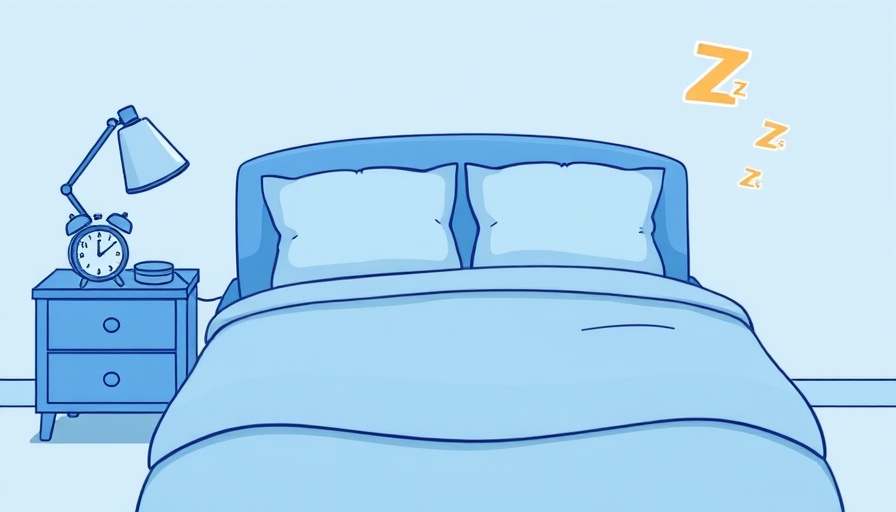
Understanding the Importance of Sleep Health for Families
As parents, ensuring a good night’s sleep for your family is essential for overall well-being and performance. Sleep health affects many aspects of life, from mood and cognition to physical health. For children and adolescents, proper sleep duration and quality can impact learning, behavior, and growth. It's crucial to develop habits that promote peaceful sleep, thus improving sleep quality for everyone in the household.
Creating a Sleep-Conducive Environment
Staging a bedroom goes beyond making it visually appealing; it involves crafting an environment that promotes restful sleep. This means paying attention to factors such as sound, light, and temperature. For example, using blackout curtains can help keep the room dark, promoting melatonin production, which is essential for sleep regulation. Likewise, controlling noise pollution from outside can prevent interruptions during the sleep-wake cycle. Furthermore, the right bedding, including quality mattresses and pillows, can enhance comfort and support healthy sleep.
Incorporating Healthy Bedtime Routines
Establishing a consistent bedtime routine is a key strategy for improving sleep among children and parents alike. This can include activities that promote relaxation and winding down, such as reading or gentle yoga before bed. Engaging in mindfulness practices can also pave the way for better sleep habits, allowing the mind to slow down as the day ends. Practices such as aromatherapy with calming essential oils can further enhance a peaceful atmosphere, making it easier for family members to transition into sleep. Moreover, it is worth considering how electronics use, especially screens, can influence sleep quality. Limiting screen time in the evening can reduce exposure to blue light, which is known to interfere with circadian rhythms.
Fostering Sleep Hygiene
Sleep hygiene involves habits and practices conducive to sleeping well on a regular basis. Teaching children about sleep hygiene can establish lifelong habits for health. This might include maintaining a regular sleep schedule, getting adequate sunlight during the day to help regulate circadian rhythms, and ensuring a hygienic sleeping environment devoid of allergens. Parents can model these behaviors, encouraging positive attitudes toward sleep that young ones can adopt, leading to a generation more knowledgeable about sleep disorders and health.
Addressing Common Sleep Disorders
Parents should be aware of prevalent sleep disorders that could affect their children, such as insomnia, sleep apnea, and restless leg syndrome. Recognizing symptoms early can lead to timely consultations with sleep specialists. It is also wise to note how sleep issues can affect a child's mood and even academic performance. Understanding the linkage between sleep and mental health, notably anxiety and depression, underscores the need for parents to advocate for their children's sleep health.
Reconciling Sleep with Cultural Practices
Every culture has unique approaches to sleep. For instance, many communities prioritize communal sleep environments or family bed-sharing, which may enhance feelings of safety and bonding, thus promoting emotional well-being for children. Exploring and integrating effective sleep practices from various cultures can offer insights into optimizing family sleep health. Being mindful of different sleep patterns can foster an environment where everyone feels supported in their need for restorative sleep.
Leveraging Technology for Better Sleep
In today’s digital age, wearable devices and mobile applications can assist in monitoring sleep patterns and educating families about their sleep. Such technology can provide insights into sleep duration and quality, making it possible to implement tailored strategies for improvement. However, as we embrace technology, we should remain cautious about potential over-reliance which might clash with natural sleep practices.
Now Is the Time for Sleep Awareness
With increasing knowledge about sleep health, it’s vital for families to engage in sleep awareness campaigns and educational programs. Schools and community resources can provide parents with the tools and information needed to support healthy sleep habits. Regular discussions about sleep within families can foster a culture that values rest, ultimately leading to improved health outcomes across generations.
By recognizing the interconnectedness of sleep and family health, parents can take actionable steps to ensure their homes support restful and restorative sleep for everyone. Adopting effective sleep practices is not just about enhancing comfort; it's also about equipping future generations with the knowledge and resources critical for overall wellness.
Taking control of your family's sleep environment today will shape their health tomorrow!
 Add Row
Add Row  Add
Add 




Write A Comment